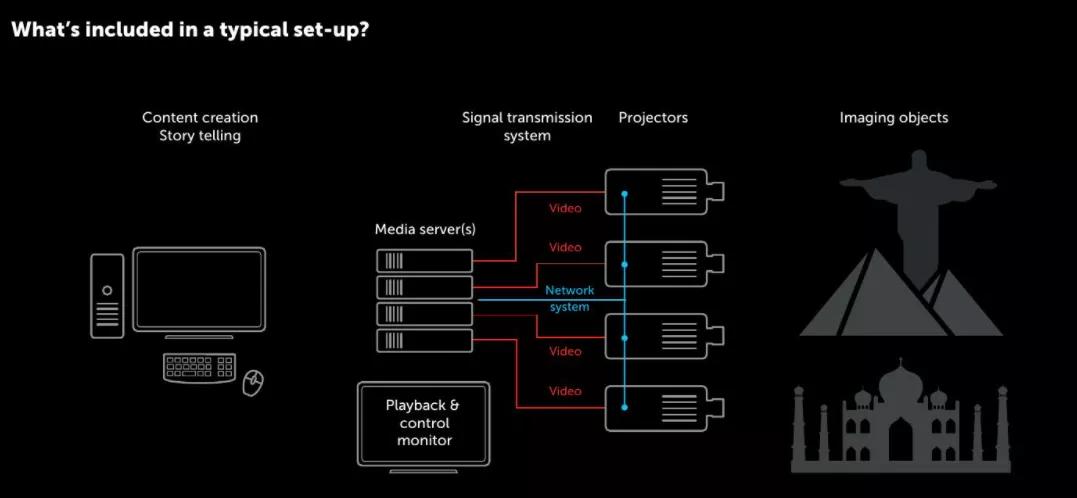Projection mapping: starting from scratch
読み終わるまでの時間:約4分
If you are a venue that lends itself to projection or a supplier with a potential client that is open to new ideas, how do you develop a projection mapping project? Depending on the particular circumstances, there are a few things to look out for.
What do you want to achieve?
The first question to ask is what one wants to achieve with the projection mapping. Will it be used as a tourist attraction? Is there an actual story that has to be told or are we talking about a purely visual entertainment experience?
One of the most frequent uses is for increasing visitors to a city or monument. In this case, there are still several options. Laurent Lhuillery of Light Event Consulting often works with historic monuments in France and elsewhere. He is a firm believer in researching the location to find the “story” that can be told. “If you go for something purely spectacular,” he points out, “the spectators can tire of it. If you go deeper, visitors can find something new every time they see it.” This opens the door to repeat visits, either in the same season or the following year.
How the location can shape a project
Projection mappings onto landmark buildings continue to be a major attraction. These range from the pearls of architectural heritage to bridges, chimney stacks and dams. As the projectors have become progressively more powerful and reliable, project managers have been able to develop shows that are increasingly impressive. Yet the same technology can be used to create smaller experiences in museums, shopping malls, fashion shows or permanent projections on monuments.
Arnaud Meulemeester, Business Developer of Dirty Monitor is touring with immersive art exhibitions and confirms the importance of location. “In places like Hong Kong and Dubai, things move very quickly,” he claims. “We typically book a venue for one to three months, because after that it is not new anymore, so it is not attractive anymore.” Other operators talk of a more reasonable 8-month turnover for fixed installations.
Is it better to rent or to buy?
Projection mapping is now used for a wide range of projects. They consequently often use very different funding structures determined by the size and nature of the projects, as well as the needs and resources of the partners. Each model comes with its own constraints and potential. Although venue and location managers predominantly rent equipment for the duration of the occasional show, some of the locations with permanent mappings are increasingly buying their own equipment.
The reasoning is that they will be using it for long periods of time per year and over a number of years. “The Lyon festival is over three days,” explains Lhuillery. “The hotels are full for three days and after that, it's over. In Chartres, however, we run things over 200 days a year. We own all the equipment. So, when we renovate, we simply renovate the artistic aspect. We're self-sufficient. I've got people in-house who are skilled at setting up the equipment. Not to the level of a Barco technician, of course, but who are capable of setting up a show, change lights, clean the machine and restart a server. When you play live 200 days a year, you become self-sufficient.”
From design to set-up
Download e-book
Graphic design is a vital part of the whole immersive experience. But for the professionals, it is the visible part of a far more complex iceberg. It all starts with a goal, such as illuminating a monument, animating a town center or reinventing an artist’s work for a museum or exhibition.
Designers then sit down and start imagining the result using detailed plans of the building. In addition to actual images and a storyline, they have to decide how it fits in the overall project. Specialized software within modern media servers integrates all necessary data about the object to be illuminated and the surroundings.
The previsualization shows how the light will fall on certain angles and what the content will look like from different perspectives. This saves lots of time and effort during the set-up itself. “Working with the 3D media servers gives us far more accurate preproduction planning and projection studies,” according to Steve Cain Head Engineer and Media Server Specialist at TDC (Australia). “This allows us to deliver increased projection output. These 3D modelling features, together with a multi-skilled team, has helped us get sites up and running far more quickly and efficiently.”
How long does it take to get started?
Never under-estimate the time involved. Steve Critchley is head of audio visual at Infinity des Lumières in Dubai. Talking about a recent show based on Van Gogh, he notes that it took eight months to a year to get everything running from the first talks with the venue. “And we were working with an existing concept with existing artwork,” he notes.
On a purely technical level, Patrick Bellens of TCF notes that, “When we go on-site, from the technical installation until opening is usually about two to three weeks. But of course, before that there is a few months of planning and site visits and stuff like that going on.”
As all event professionals know, you should hope for the best and prepare for the worst!
The next step? Choosing the right projection tools. Make sure to check our upcoming article on projection mapping tools.


